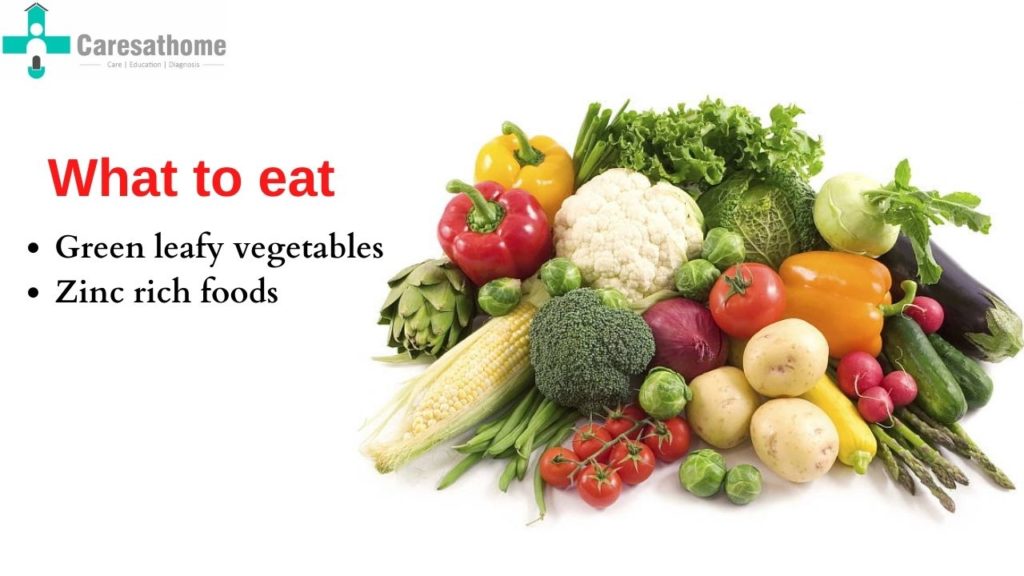What to Eat for Better Health: Green Leafy Vegetables & Zinc-Rich Foods
Incorporating nutrient-dense foods like green leafy vegetables and zinc-rich foods into your diet is a great way to boost your overall health. These foods provide essential vitamins and minerals that support immune function, energy production, and overall well-being.
1. Green Leafy Vegetables
Green leafy vegetables are packed with nutrients like vitamins A, C, K, and folate, along with fiber and antioxidants. These vegetables are also low in calories, making them an ideal addition to any meal. Here are some of the best options to include in your diet:
a. Spinach
- Nutrients: Rich in iron, magnesium, calcium, and folate, spinach is excellent for maintaining strong bones, supporting muscle function, and improving blood circulation.
- How to Eat: Add to salads, smoothies, or stir-fries for an easy nutrition boost.
b. Kale
- Nutrients: Kale is loaded with vitamins A, C, and K, as well as antioxidants that fight inflammation.
- How to Eat: Enjoy kale in salads, as baked chips, or sautéed with garlic for a delicious side dish.
c. Collard Greens
- Nutrients: High in fiber, calcium, and vitamin K, collard greens promote bone health and support digestive health.
- How to Eat: Cooked collard greens pair well with lean meats or can be used as a wrap for sandwiches.
d. Swiss Chard
- Nutrients: Packed with vitamin K, magnesium, and iron, Swiss chard supports healthy blood pressure and heart health.
- How to Eat: Add to soups, stews, or use as a side dish sautéed with olive oil.
e. Arugula
- Nutrients: A good source of folate and calcium, arugula helps with brain health and bone maintenance.
- How to Eat: Use it as a base for salads or add to sandwiches and wraps for extra flavor.
2. Zinc-Rich Foods
Zinc is a vital mineral that supports immune function, wound healing, and cell growth. It’s also crucial for skin health and regulating enzymes in the body. Here are some zinc-rich foods to include in your diet:
a. Meat and Poultry
- Sources: Beef, pork, and chicken (especially dark meat) are great sources of zinc.
- Health Benefits: Helps repair tissues, maintain immune defenses, and support overall growth.
b. Shellfish
- Sources: Oysters are particularly high in zinc, but other shellfish like crab, shrimp, and mussels are also good sources.
- Health Benefits: Shellfish provide a concentrated amount of zinc, which is essential for immune health and metabolic function.
c. Legumes
- Sources: Chickpeas, lentils, and beans (like black beans and kidney beans) are plant-based sources of zinc.
- Health Benefits: These foods are also high in protein and fiber, which aid digestion and heart health.
d. Nuts and Seeds
- Sources: Pumpkin seeds, cashews, and almonds are high in zinc and healthy fats.
- Health Benefits: Nuts and seeds are perfect for maintaining skin health, boosting immune defenses, and providing energy.
e. Whole Grains
- Sources: Quinoa, brown rice, and oats are grains that contain zinc, along with fiber and essential nutrients.
- Health Benefits: Whole grains promote digestion and heart health while providing a steady supply of energy.
f. Dairy Products
- Sources: Milk, cheese, and yogurt are also good sources of zinc.
- Health Benefits: Dairy provides calcium along with zinc, which supports bone strength and immune function.
Conclusion
To maintain optimal health, aim to incorporate a variety of green leafy vegetables and zinc-rich foods into your meals. Green leafy vegetables provide essential vitamins and minerals that support overall well-being, while zinc-rich foods play a critical role in immune function and cellular health. A balanced diet that includes these nutrient-packed options will help you stay energized and healthy.
Whether you’re blending spinach into your smoothies, snacking on nuts, or enjoying a seafood meal, these nutrient-rich foods will benefit your body and mind.

